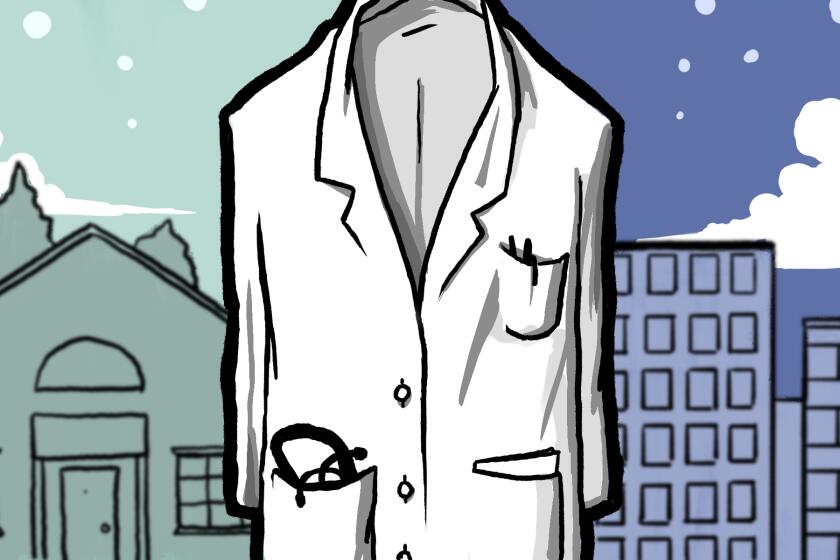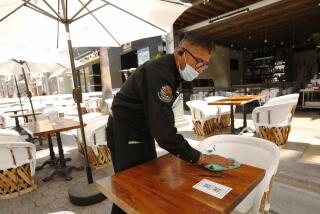Op-Ed: Desperate small businesses are being pushed to the back of the coronavirus relief line. Why?
On Friday, banks across the country began accepting applications from struggling small businesses desperate to get a piece of the $2-trillion stimulus package authorized by the CARES Act. Unfortunately, many of those small businesses — and perhaps those that need the money the most — may be left waiting at the back of the line as others exhaust the available funds.
The key provision of the CARES Act for small businesses is the Paycheck Protection Program, or PPP, which seeks to inject an immediate $350 billion into small businesses struggling from the COVID-19 pandemic. It’s the small business version of the $1,200 in stimulus checks heading to individual taxpayers.
The program works by giving a small business a loan equal to 250% of its average monthly payroll, and the loan can be forgiven if 75% of the proceeds are spent on payroll in the first eight weeks of the loan. The idea is to throw a lifeline to these businesses and their employees. If you run a small business that has struggled because of COVID-19 — and what small business hasn’t — you should be looking to apply for a PPP loan.
But the Paycheck Protection Program is a first-come, first-served deal. And so far, many of the smallest of small businesses — the coffee shop around the corner, or your favorite neighborhood food truck or nail salon — are finding themselves at the back of the line.
A doctor leaves the calm of home to work in the charged atmosphere of the hospital where sober conversations abound about the possibility of being overrun with COVID-19 cases.
The problem is the rules for distributing the money. Congress chose to dispense the PPP $350 billion through a network of approximately 2,000 banks authorized to make Small Business Administration loans. The CARES Act instructs these banks to approve PPP applications quickly regardless of a business’ credit risk. But the banks are still banks, and Department of Treasury rules going back to the 1970s require that they meet “know your customer” regulations meant to prevent money-laundering and terrorist financing.
In the rush to implement the CARES Act bailouts, the applications from customers the banks already “know”are the ones getting accepted and processed. Small businesses that have never been vetted for a loan, or that don’t already have an account at an SBA-approved lender will face long delays as the bank studies their past cash needs, confirms their corporate structures, and verifies the identities of their owners. And cash-intensive businesses, like local cafes and salons, where the risk of money-laundering is greater, could get particular scrutiny.
Many banks say they expect to accept PPP applications from new customers in the coming days and weeks, but will the funds still be there?
On Friday, Bank of America reported that in its first day for PPP applications, its customers submitted applications for $22.2 billion of PPP loans. Wells Fargo on Sunday said it would accept no more applications from businesses known or new to the bank. Wells can lend a maximum of $10 billion, owing to sanctions placed on it for past rule-breaking, and after just one day, it had applications in hand that amounted to more than that limit. If private-equity-backed companies are also allowed to apply for this funding, as is rumored, they too should be able to check banks’ know-your-customer — or “KYC” — boxes immediately and they could further drain the PPP allocation ahead of small businesses that have yet to comply with the regulations.
Rules preventing money-laundering and terrorist financing are worthy, but they don’t fit the Paycheck Protection Program goals. Instead of KYC standard operating procedure, the Treasury Department should view CARES Act lending in light of what the legislation is all about — macroeconomic stimulus, not making long-term business loans.
Special know-your-customer rules should be put in place to match the limited purpose of PPP loans and the urgency of the pandemic situation. Applicants should be required to prove they are what they claim to be by presenting basic organizational documents, past tax filings, board resolutions authorizing the businesses’ officers, and proof of those officers’ identities (a driver’s license should do).
The Treasury Department should act now to ensure that small businesses do not lose out in the race for PPP funds simply because they don’t already have a bank loan and a preexisting relationship with a Small Business Administration lender. Otherwise, by the time your neighborhood cafe makes its way to the front of the PPP line, the $350 billion may be depleted and the cafe, its owners and its employees may be out of luck. And once we’re all free again to go out for breakfast, lunch and dinner, we may be too.
Robert Bartlett is a law professor at UC Berkeley and co-director of the Berkeley Center for Law and Business. Adam Sterling is the executive director of the Berkeley Center for Law and Business.
More to Read
A cure for the common opinion
Get thought-provoking perspectives with our weekly newsletter.
You may occasionally receive promotional content from the Los Angeles Times.







